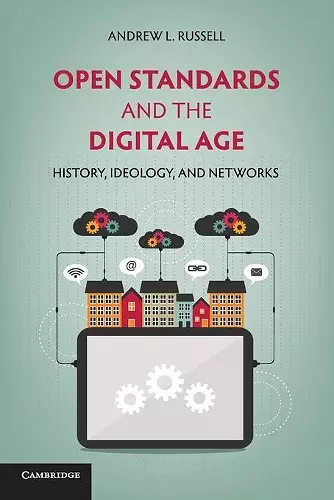Open Standards and the Digital Age
History, Ideology, and Networks
Format:Paperback
Publisher:Cambridge University Press
Published:28th Apr '14
Currently unavailable, and unfortunately no date known when it will be back
This paperback is available in another edition too:
- Hardback£77.99(9781107039193)

This book answers how openness became the defining principle of the information age, examining the history of information networks.
How did the idea of openness become the defining principle for the twenty-first-century information age? This book answers this question by looking at the history of information networks and paying close attention to the politics of standardization.How did openness become a foundational value for the networks of the twenty-first century? Open Standards and the Digital Age answers this question through an interdisciplinary history of information networks that pays close attention to the politics of standardization. For much of the twentieth century, information networks such as the monopoly Bell System and the American military's Arpanet were closed systems subject to centralized control. In the 1970s and 1980s however, engineers in the United States and Europe experimented with design strategies to create new digital networks. In the process, they embraced discourses of 'openness' to describe their ideological commitments to entrepreneurship, technological innovation, and participatory democracy. The rhetoric of openness has flourished - for example, in movements for open government, open source software, and open access publishing - but such rhetoric also obscures the ways the Internet and other 'open' systems still depend heavily on hierarchical forms of control.
'This book contributes significantly to our understanding of the current state of affairs in information technology and governance, while also making original contributions to our understanding of the evolution of business institutions across the long twentieth century. Drawing on substantial original research, Andrew L. Russell argues that processes for setting industry standards have embodied broadly felt (and often competing) values regarding American governance. … In the process, we come to see how the current enthusiasm for open systems and standards fits in a larger story of American governance. The current situation is neither a radical break nor an idealized state, as much contemporary literature insists and celebrates. Rather, it is a refinement in the face of shifting economic conditions that reflects and draws on a persistent commitment to economic liberalism. This is an important point that will garner considerable attention from historians and contemporary business analysts.' Steven W. Usselman, Chair of the School of History, Technology and Society, Georgia Institute of Technology
'Andrew L. Russell's book describes how we got to the twenty-first-century information society, the 'Open World', through focusing a standardization lens on the history of American communication and information technology as it evolved from the late nineteenth century. Russell's book is the first history of American communication and information technology to focus on standardization and its processes and implications. Understanding how standardization has evolved is critical to understanding our commercial world today, and Russell provides a key contribution by exploring its evolution in the realm of ICTs. … a real contribution to the literature. He also adds to the field by showing that the notions and values of open standards, open systems, and the Open World have a long prehistory.' JoAnne Yates, Sloan Distinguished Professor of Management and Professor of Managerial Communication and Work and Organization Studies, Massachusetts Institute of Technology Sloan School of Management
'This book is a major contribution to both the history of the Internet and the role of technical standards. Russell deals with a set of complex issues, grounding these in the prior work of historians of technology, using language that makes this book accessible to a larger audience than just experts on the Internet or computing. Tightly argued and well informed, this book constitutes a major step forward in our understanding of three issues: how the Internet evolved, the role of technical standards in American communications, and the complexity and collaborative activities of diverse individuals and institutions. Russell provides a useful explanation of how the modern world acquired key components of its contemporary communications infrastructure. … this is an important book that deserves to be read by historians of computing, communications, modern technologies, business, post-1865 American society, and by those concerned with our current governance of technological issues.' James W. Cortada, The American Historical Review
'Open Standards and the Digital Age is a densely written book based on a significant number of primary sources and a rich, multidisciplinary bibliography. Andrew L. Russell paints on a big canvas, but … summary sections for each chapter, as well as the introduction and conclusion chapters, bring the main threads together to provide a refreshing view on the history of the early communications networks, and particularly of the more recent digital ones.' Dov Lungu, Isis
ISBN: 9781107612044
Dimensions: 229mm x 152mm x 17mm
Weight: 450g
326 pages